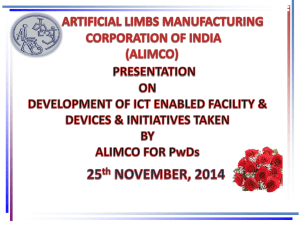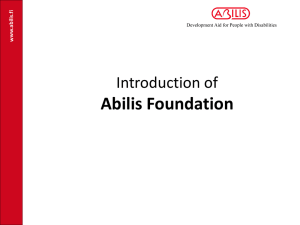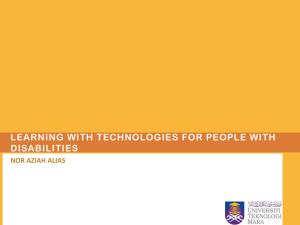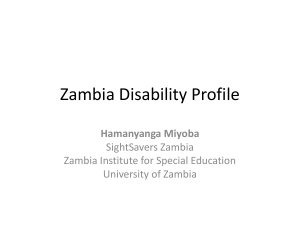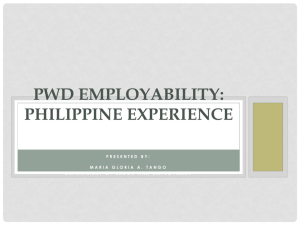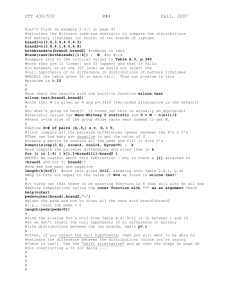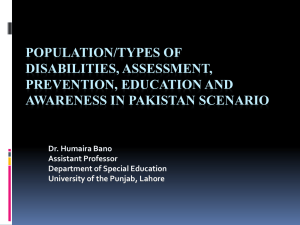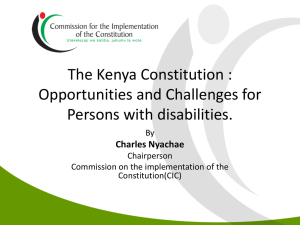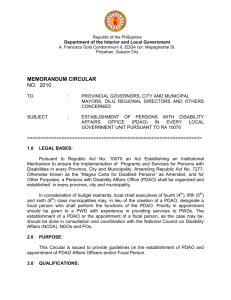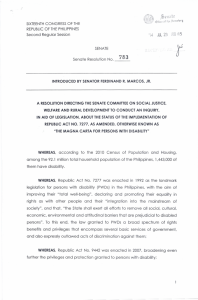Rules and Regulations Implementing Executive Order No. 261
advertisement
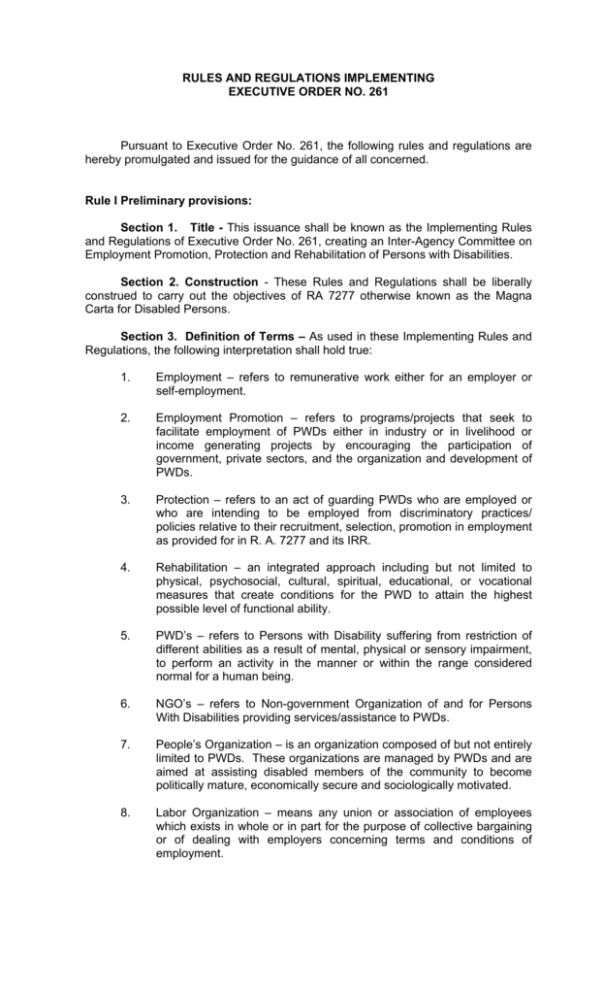
RULES AND REGULATIONS IMPLEMENTING EXECUTIVE ORDER NO. 261 Pursuant to Executive Order No. 261, the following rules and regulations are hereby promulgated and issued for the guidance of all concerned. Rule I Preliminary provisions: Section 1. Title - This issuance shall be known as the Implementing Rules and Regulations of Executive Order No. 261, creating an Inter-Agency Committee on Employment Promotion, Protection and Rehabilitation of Persons with Disabilities. Section 2. Construction - These Rules and Regulations shall be liberally construed to carry out the objectives of RA 7277 otherwise known as the Magna Carta for Disabled Persons. Section 3. Definition of Terms – As used in these Implementing Rules and Regulations, the following interpretation shall hold true: 1. Employment – refers to remunerative work either for an employer or self-employment. 2. Employment Promotion – refers to programs/projects that seek facilitate employment of PWDs either in industry or in livelihood income generating projects by encouraging the participation government, private sectors, and the organization and development PWDs. 3. Protection – refers to an act of guarding PWDs who are employed or who are intending to be employed from discriminatory practices/ policies relative to their recruitment, selection, promotion in employment as provided for in R. A. 7277 and its IRR. 4. Rehabilitation – an integrated approach including but not limited to physical, psychosocial, cultural, spiritual, educational, or vocational measures that create conditions for the PWD to attain the highest possible level of functional ability. 5. PWD’s – refers to Persons with Disability suffering from restriction of different abilities as a result of mental, physical or sensory impairment, to perform an activity in the manner or within the range considered normal for a human being. 6. NGO’s – refers to Non-government Organization of and for Persons With Disabilities providing services/assistance to PWDs. 7. People’s Organization – is an organization composed of but not entirely limited to PWDs. These organizations are managed by PWDs and are aimed at assisting disabled members of the community to become politically mature, economically secure and sociologically motivated. 8. Labor Organization – means any union or association of employees which exists in whole or in part for the purpose of collective bargaining or of dealing with employers concerning terms and conditions of employment. to or of of 9. Vocational Rehabilitation – refers to integrated measures that shall serve to develop the skills and potentials of PWDs and enable them to engage/reengage in livelihood activities or income generating projects and compete/recompete favorably for available productive and remunerative employment opportunities in the labor market. 10. Qualified Individual with Disability – refers to persons with disability belonging to the legal working age, and holding or desiring employment who can perform the essential functions or tasks in accordance with reasonable job description prescribed and adapted by the employer. 11. Occupational Safety and Health (OSH) – refers to existing Occupational Safety and Health Standards and/or programs that ensure safe and healthful working conditions in all places of employment. 12. Alternative Work Arrangements – are employment options not contrary with any existing labor laws that could be arranged with employers to accommodate PWD’s. This may be in form of: a. Enclave – where employers allocate/reserves job specifically for PWD’s in normal work setting. Group of PWD’s is recruited and trained together for that job e.g. packaging, wrapping, assembly work, typing/encoding. b. Work Crew – employer hires a group of PWD’s to render specific services for a specific duration. e.g. janitorial gardening, etc. c. Homework – employer provides the work and tools to PWD’s home and collects and pays him/her for the work done. d. Self-Employment/Cooperatives – employers provide seed money to individual or group of disabled workers to start their own small business in their community. Rule II – Creation of a Committee: Section 1. - The Secretary of the Department of Labor and Employment shall organize and chair the Inter-Agency Committee on Employment Promotion, Protection, and Rehabilitation of Persons with Disabilities. Section 2. - Member agencies shall be the following: 1. Secretary of the Department of Social Welfare and Development 2. Secretary of the Department of Education, Culture and Sports 3. Secretary of the Department of Trade and Industry 4. Secretary of Department of Health 5. Secretary of Department of Interior and Local Government 6. Chairman of the Civil Service Commission 7. Director General of the Technology and Livelihood Resource Center 8. Executive Director of the Employees’ Compensation Commission 9. Director General of the Philippine Information Agency 10. Executive Director of the National Council of the Welfare of Disabled Persons 11. President of the Katipunan ng May Kapansanan sa Pilipinas, Inc. 12. President of the Employers Confederation of the Philippines (ECOP) and President of the Philippine Chamber of Commerce and Industry (PCCI) 13. President of Trade Union Congress of the Philippines (TUCP) and President of the Federation of Free Workers (FFW); and 14. Three (3) representatives of NGO’s actively involve in providing employment services for PWDs representing different disability group. (Representatives shall be nominated by the organization and approved by the Committee) Section 3. Secretariat The Bureau of Local Employment of the Department of Labor and Employment shall serve as the Committee’s Secretariat. It shall also serve as liaison/coordinating arm with Congress and other government and nongovernment agencies including existing Regional Council in matters related to the protection, promotion, vocational rehabilitation, training and employment of PWDs. Rule III – Functions of the Committee Section 1. The Committee shall have the following functions: 1. To coordinate and monitor the implementation of and compliance with the employment provisions of the Magna Carta for Disabled Persons, and other relevant laws pertaining to employment. 2. To strengthen and ensure cooperation among all government and nongovernment agencies by: 3. 2.1 Complementing available resources in enhancing and promoting the employment of PWDs; 2.2 Promoting the alignment of policies and programs pertaining to training, employment and rehabilitation of PWDs as contemplated in the Magna Carta for Disabled Persons and other relevant laws; 2.3 Collaborating with ILO and other entities towards increasing the capabilities and enhancing technical expertise of its committee members and program implementors through participation in training, study tours and similar activities. To identify, formulate and advocate legislative and administrative measures and policies designed to promote, protect and uplift the employment of persons with disabilities, and ensure that the training and employment concerns of PWDs are addressed by the National and Regional Employment Plans. 4. To develop, coordinate and implement a continuing program of public information and education through conduct of: 4.1 Relevant studies and researches on training, employment, vocational rehabilitation, including occupational safety and health of PWDs in the workplace. 4.2 Awareness-raising and advocacy programs, particularly those pertaining to equalization of employment opportunities and participation of persons with disabilities in the economic development of the country. Section 2. Reports of the Committee: 1. The committee, through the Chairperson, shall submit a semi-annual report of its activities to the President. 2. All participating member agencies shall regularly submit quarterly accomplishment report to the secretariat for consolidation. Section 3. Meetings of Committee: 1. Each member agency shall designate a permanent member and an alternate who are technically well verse on programs concerning PWDs to represent committee meetings. 2. Meetings shall be held once every quarter and when necessary. Rule IV – Role of Each Organizations: Section 1. Role of Government Agencies: 1. Recommend policies and programs for strengthening vocational training and employment of persons with disabilities and prevention of causes of disability in line with OSH standards; 2. Conduct basic occupational safety and health training courses for PWDs. 3. Collect, maintain and make available all relevant data and information concerning the training and employment of PWDs; 4. Conduct relevant studies and researches relative to the training and employment of PWDs; 5. Develop information materials and conduct information campaign to promote training, employment and development of work values and attitudes of PWDs 6. Provide assistance to employers and trade unions relative to the recruitment selection, training, employment, occupational safety and health, and rehabilitation of PWDs; 7. Issue memoranda to LGUs to effect the implement of EO 261. 8. 9. Formulate policy for the adaption of alternative work arrangements for PWDs by employers; Ensure that information on training, employment and vocational rehabilitation opportunities are made available at all national agencies and local government units; and 10. Provide rehabilitation facilities to PWDs who will avail of the rehabilitation services. 11. Include in each agency Annual Work and Financial Plans the budget necessary to ensure the implementation of this Executive Order. Section 2. Role of the Employers Group: 1. Adopt a policy for the promotion of training and suitable employment and working conditions of PWD’s and the integration of a vocational rehabilitation and job relocation programs for workers disabled on the job. 2. Formulate company policies, rules and regulations relative to the adaption of a suitable work environment with accessibility and other features that would ensure safe and healthful conditions of work and production methods that would enhance the productivity of employed persons with disabilities. 3. Pursue the organization and/or integration of regular training programs in industry to improve and enhance the productivity of employed PWDs. 4. Adopt alternative work arrangements to accommodate qualified unemployed PWD’s. 5. Coordinate with the DOLE and other institutions in the promotion and facilitation of employment of PWDs. 6. Coordinate with institutions such as SSS in facilitating/fast-tracking processing of disability benefits. 7. Participate in the formulation of policies employment and rehabilitation of PWDs. concerning training, Section 3. Role of Trade Unions: 1. Promote the adoption of alternative work arrangements establishments to accommodate qualified unemployed PWDs; in 2. Formulate guidelines that would ensure the safety and health of PWD workers and in accordance with OSH program/standard; 3. Prepare guidelines related to shop-floor arrangements, job adaptation, special work organization, work norms for adaption by emloyers; 4. Ensure that vocational rehabilitation and employment concerns of employed PWDs are calendared for agenda at trade union meetings and that information on action taken are dessiminated through publications and other practical methods; 5. Adapt training and employment policies for PWDs consistent with the provision of RA 7277. Section 4. Role of Persons with Disabilities Organizations 1. Participate actively in the planning and development of training, employment promotion protection, OSH, and rehabilitation programs; 2. Assist in monitoring and evaluating the implementation of the Employment Provisions of RA 7277; 3. Provide feedback on major issues and concerns affecting their training and employment, occupational safety and health and rehabilitation; 4. Assist in assessing their training needs and in preparing their members avail of training and employment programs and services; Section 5. Role of Non-Government Organizations 1. Participate actively in the planning and development of training, employment and vocational rehabilitation programs for PWDs. 2. Access fund assistance from lending/financial institution and other government agencies and assist PWDs finance their identified training programs and livelihood projects. 3. Assist PWDs identify training needs and other employment related assistance necessary to prepare them socially and economically. 4. Appraise/evaluate business/project plans and ensure feasibility and sustainability to assisted PWD’s livelihood projects. 5. Assist in monitoring and evaluating the implementation of assisted PWD training programs and livelihood projects. 6. Provide feedback or recommend policies on major issues and concerns affecting the training and employment of PWDs. Rule V. Effectivity These rules and regulations shall take effect fifteen (15) days after the date of publication in the official gazette promulgated by: (Signed) CAPT. OSCAR J. TALEON Sectoral Representative Social Reform Council (Signed) HON. LINA B. LAIGO Secretary (Signed) HON. CRESENCIANO B. TRAJANO Secretary Department of Social Welfare & Development Department of Labor and Employment
